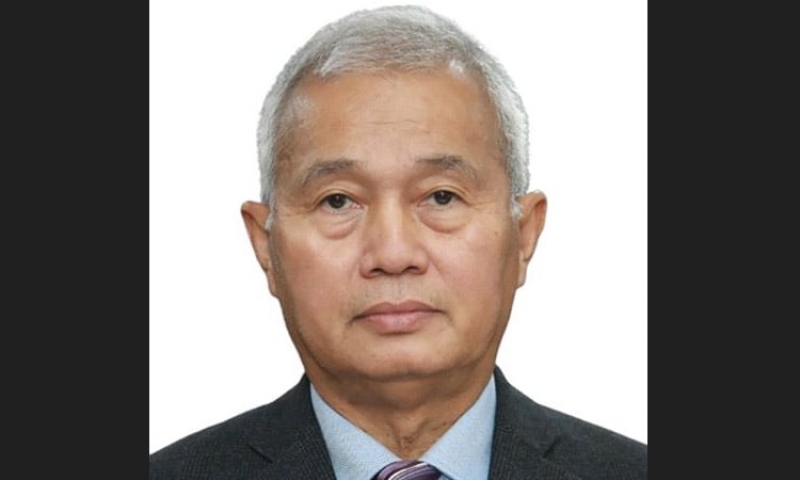- CA Yunus pays homage to Liberation War martyrs on Victory Day |
- Bangladesh capital market extends losing streak for second day |
- Bangladesh celebrates Victory Day Tuesday |
- 'Different govts presented history based on their own ideologies': JU VC |
Govt to boost education, living standards in CHT: Adviser

Chittagong Hill Tracts Affairs (CHT) Adviser Supradip Chakma today said his ministry has been working on three major agenda - ensuring quality education, improving quality of people's life and development of the environment in CHT region.
He said these in an exclusive interview with Bangladesh Sangbad Sangstha (BSS) recently.
When asked about the adviser's thoughts on the Chittagong Hill Tracts, he said, "During my tenure as chairman of the Chittagong Hill Tracts Development Board, I visited every corner of the region to know the condition of the people and condition of each ethnic group."
He said a leader needs to know about the needs in Khagrachhari, Bandarban and Rangamati.
Supradip said the government is giving a lot of money to the Chittagong Hill Tracts. "But, we are not able to do anything collectively. Government offices cannot do anything collectively. A lot of public money has been allocated for that region but development is not taking place that way," he said.
When asked about ensuring quality education for the ethnic groups of the Chittagong Hill Tracts, he said, "My concern has always been to ensure quality education in the Chittagong Hill Tracts."
"We have to compete (with other regions). We will not always have a quota. To compete, we have to establish some good schools and colleges," he added.
"My concern is satellite education. For this, hostels have to be built at the upazila and district levels," he said.
After studying up to class three or four, the children will come to the upazila hostel and study up to class eight. After that, they will study up to intermediate in the district hostel, the adviser elaborated.
"For this, we have to build some good schools at the upazila and district levels. If they can study in these schools, they would be ready to compete at any level."
"When I was the chairman of the Development Board, I talked about building 40 hostels in three districts of the Chittagong Hill Tracts. I don't know whether those would be made," he said.
He also said, apart from quality education, he has two other agendas for the Chittagong Hill Tracts - improving the quality of life of the people of that region and improving the environment.
"My thought is that if women are empowered, the capacity of the family will increase. If the capacity of the family increases, it will be possible to ensure education of their children," he said.
The capacity of all ethnic groups in the hills is not the same and each of them will have to be brought up through small and big cooperation, he added
The adviser said his third agenda is the development of the environment of the hills.
"Houses are being built everywhere in the hills. I am not in favor of this. Our research has shown that the amount of water in the big rivers of the hills has decreased," he said.
"We have to protect the forest land. For this, we have to plant trees that conserve water. Only then will our forests return to their previous state," he said.
Regarding the issues of making the Chittagong Hill Tracts attractive for tourism and ensuring security, he said, there are many things to attract tourists to this region but there is a lack of security.
"These will not happen overnight. We have to work continuously. If the tourism industry develops, the economic development of the hill areas will also happen," said Supradip.
Regarding the issue of stopping extortion in the Chittagong Hill Tracts, he said, "We are developing day by day. Our forces are also contributing a lot. But we still have some difficulties with security. We have to work to overcome this situation. My thought is that if we can rehabilitate the extortionists by providing them with jobs, then hopefully that difficulty will reduce."
When asked about the main obstacles to the development of the Chittagong Hill Tracts, the adviser said, the government is keeping all doors open for development in the Chittagong Hill Tracts.
"But the main problem is that our people do not know from where to take what advantage," he said, adding the agriculture department has done the best in the hilly regions, reports BSS.
It has been seen that they have planted trees and are watering those but they are not bearing fruit, he said, adding, "This is a problem. The solution to this can be found by going to the agriculture office. But they don't know it. For this, awareness needs to be raised among the hill people. My people themselves don't know where to ask for what."
"Besides, there are many handicrafts in that region. They sell an item as cloth for Taka 100. But if you sell that as a dress, it will cost Tk 700. This is what we are trying to explain to them."
"I have a project going on in the Chittagong Hill Tracts. Sixty to seventy women from different communities are working there. We are trying to find out how to produce cloth and market it through them."

